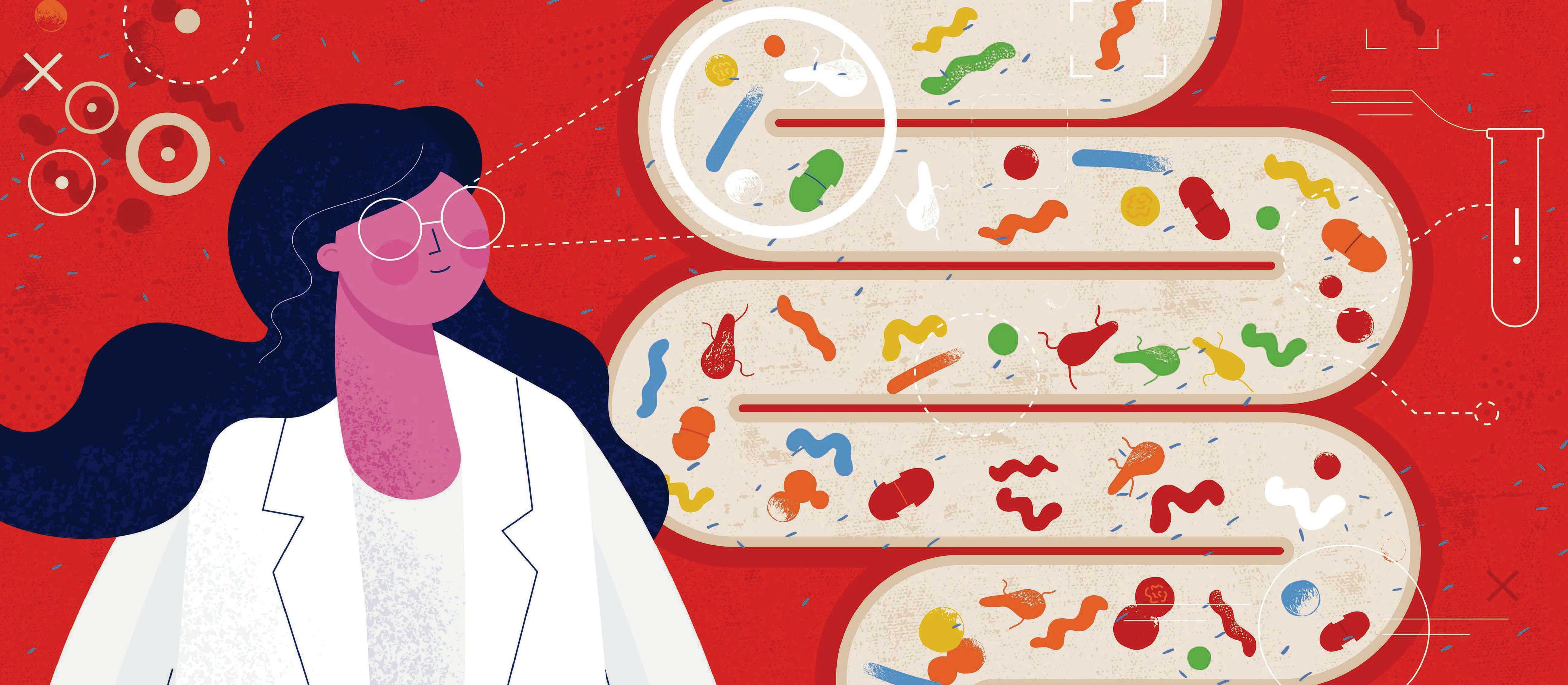Prøve GULL - Gratis
HARD TO STOMACH
BBC Science Focus
|February 2025
Despite being a common condition, the cause of irritable bowel syndrome has proven tricky to find. Now researchers are beginning to understand what's going on in our guts... and the best ways to soothe them

One in ten people suffer after eating a meal.
Instead of sitting back to relax while feeling sated, nourished and full, these people associate finishing a dish with stomach cramps, bloating and problems emptying their bowels (either too quickly or too slowly).
This suffering is caused by irritable bowel syndrome (IBS) and it's estimated that around 10 per cent of the world's population (possibly more according to some estimates) experiences it to some degree.
IBS is an unpleasant experience for anyone afflicted with it, and that tends to be more women than men. Yet for such a common condition, we know frustratingly little about what causes it and how to go about treating it.
There are plenty of suggestions for possible causes.
For example, some point towards a leaky gut, where toxins might pass through the intestine walls and into your bloodstream. Others cite changes in the gut microbiome, or 'visceral hypersensitivity', where the nerves in the gut become over-sensitive and send amplified pain signals to the brain.
But pinpointing the precise mechanism that causes IBS has, so far, been impossible. And without a known cause or any clearly identifiable biomarkers, there's no reliable test to confirm a diagnosis of IBS.
"A lot of people, when they first come to me, say: 'My doctor did all these tests and then said he doesn't really know what's wrong with me. Maybe it's IBS.' I can see they're disappointed," says Prof Alexander Ford, professor of gastroenterology at the University of Leeds.
But in the last few years, scientists like Ford have made big strides in IBS research that are providing new insights into the condition and possible treatments for it.
But the key to all of this is getting to the bottom of that so-far elusive underlying mechanism.
IDENTIFYING IBS
Denne historien er fra February 2025-utgaven av BBC Science Focus.
Abonner på Magzter GOLD for å få tilgang til tusenvis av kuraterte premiumhistorier og over 9000 magasiner og aviser.
Allerede abonnent? Logg på
FLERE HISTORIER FRA BBC Science Focus

BBC Science Focus
World's biggest cobweb is home to 100,000 spiders
Spiders don't normally create such large colonies, so there's no need to worry about finding one in your basement
1 min
February 2026

BBC Science Focus
A dementia vaccine could be gamechanging – and available already
Getting vaccinated against shingles could protect you from getting dementia, or slow the progression of the disease
1 mins
February 2026

BBC Science Focus
DATA IN SPACE
An unusual spacecraft reached orbit in November 2025, one that might herald the dawn of a new era.
7 mins
February 2026

BBC Science Focus
Climate change is already shrinking your salary
No matter where you live, a new study has found warmer temperatures are picking your pocket
4 mins
February 2026

BBC Science Focus
A MENTAL HEALTH GLOW-UP
Forget fine lines. Could Botox give you an unexpected mental health tweakment?
3 mins
February 2026
BBC Science Focus
Most people with high cholesterol gene don't know they have it
Standard testing struggles to detect the condition
1 mins
February 2026

BBC Science Focus
HOW CAN I BOOST MY IQ?
If you're serious about getting smarter, it's time to ditch the brain-training apps
4 mins
February 2026

BBC Science Focus
Humans are absolutely terrible at reading dogs' emotions
Think you can tell how our furry friends are feeling? Think again
1 mins
February 2026

BBC Science Focus
HOW TO TEACH AI RIGHT FROM WRONG
If we want to get good responses from AI, we may need to see what it does when we ask it to be evil
3 mins
February 2026

BBC Science Focus
What Australia's social media ban could really mean for under-16s
Many people think social media is bad for our kids. Australia is trying to prove it
5 mins
February 2026
Listen
Translate
Change font size

